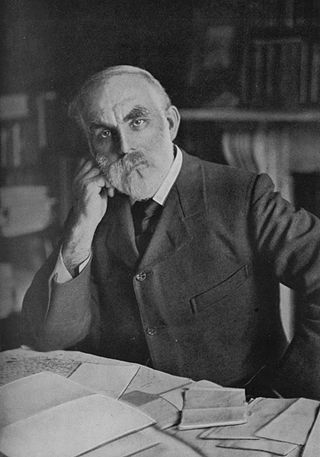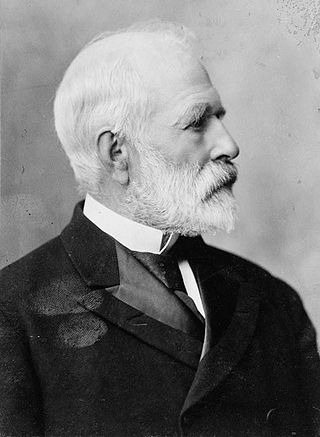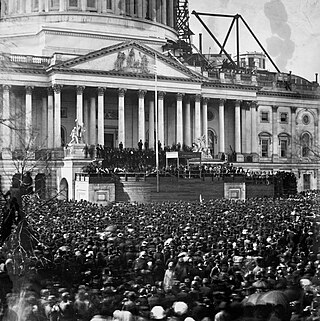
William Henry Harrison was the ninth president of the United States, serving from March 4 to April 4, 1841, the shortest presidency in U.S. history. He was also the first U.S. president to die in office, causing a brief constitutional crisis since presidential succession was not then fully defined in the U.S. Constitution. Harrison was the last president born as a British subject in the Thirteen Colonies, and was a member of the Harrison family of Virginia. He was the grandfather of Benjamin Harrison, the 23rd U.S. president.

Presidential elections were held in the United States on November 6, 1888. Republican nominee Benjamin Harrison, a former U.S. senator from Indiana, defeated incumbent Democratic President Grover Cleveland of New York. It was the third of five U.S. presidential elections in which the winner did not win the national popular vote, which would not occur again until the 2000 US presidential election. Cleveland was the last incumbent Democratic president to lose reelection until Jimmy Carter in 1980.

The Grand Army of the Republic (GAR) was a fraternal organization composed of veterans of the Union Army, Union Navy, and the Marines who served in the American Civil War. It was founded in 1866 in Decatur, Illinois, and grew to include thousands of "posts" across the North and West. It was dissolved in 1956 at the death of its last member, Albert Woolson.

John Elliot Burns was an English trade unionist and politician, particularly associated with London politics and Battersea. He was a socialist and then a Liberal Member of Parliament and Minister. He was anti-alcohol and a keen sportsman. When the Liberal cabinet made a decision for war on 2 August 1914, he resigned and played no further role in politics. After retiring from politics, he developed an expertise in London history and coined the phrase "The Thames is liquid history".

Redfield Proctor was a U.S. politician of the Republican Party. He served as the 37th governor of Vermont from 1878 to 1880, as Secretary of War from 1889 to 1891, and as a United States Senator for Vermont from 1891 to 1908.

Benjamin Franklin Tracy was a United States political figure who served as Secretary of the Navy from 1889 through 1893, during the administration of U.S. President Benjamin Harrison.

The first MacDonald ministry of the United Kingdom lasted from January to November 1924. The Labour Party, under Ramsay MacDonald, had failed to win the general election of December 1923, with 191 seats, although the combined Opposition tally exceeded that of the Conservative government, creating a hung parliament. Stanley Baldwin remained in office until January 1924.

Benjamin Harrison was the 23rd president of the United States, serving from 1889 to 1893. He was a member of the Harrison family of Virginia—a grandson of the ninth president, William Henry Harrison, and a great-grandson of Benjamin Harrison V, a Founding Father. A Union Army veteran and a Republican, he defeated incumbent Grover Cleveland to win the presidency in 1888.

Benjamin Harrison's tenure as the president of the United States lasted from March 4, 1889, until March 4, 1893. Harrison, a Republican, took office as the 23rd United States president after defeating Democratic incumbent President Grover Cleveland in the 1888 election. Four years later he was defeated for re-election by Cleveland in the 1892 presidential election.

Abraham Lincoln's first inaugural address was delivered on Monday, March 4, 1861, as part of his taking of the oath of office for his first term as the sixteenth president of the United States. The speech, delivered at the United States Capitol, was primarily addressed to the people of the South and was intended to succinctly state Lincoln's intended policies and desires toward that section, where seven states had seceded from the Union and formed the Confederate States of America.
The 1938 Lewisham West by-election was a parliamentary by-election held for the British House of Commons constituency of Lewisham West on 24 November 1938.

The Officers' Association (OA) is a registered charity in the United Kingdom, supporting Former-officers and their families providing advice and financial assistance, it was founded in February 1920 and incorporated under Royal Charter on 30 June 1921.
The Dependent and Disability Pension Act was passed by the United States Congress and signed into law by President Benjamin Harrison on June 27, 1890. The act provided pensions for all veterans who had served at least ninety days in the Union military or naval forces, were honorably discharged from service and were unable to perform manual labor, regardless of their financial situation or when the disability occurred. The bill was a source of contentious debate and only passed after Grover Cleveland had vetoed a previous version in 1887.

James R. Tanner was an American soldier and civil servant. He is best known for having lost both his legs below the knee at the Second Battle of Bull Run. Serving during the rest of the war as a government stenographer, he was present at the death of Abraham Lincoln and took notes that are the most comprehensive record of the events of the President's assassination. He later served as the United States Commissioner of Pensions, and helped reorganize and incorporate the American Red Cross.

The inauguration of Benjamin Harrison as the 23rd president of the United States took place on Monday, March 4, 1889, at the East Portico of the United States Capitol in Washington, D.C. This was the 26th inauguration and marked the commencement of the only four-year term of Benjamin Harrison as president and Levi P. Morton as vice president. Chief Justice Melville Fuller administered the presidential oath of office as rain poured down.

Annie Turner Wittenmyer was an American charitable organization leader, known for social reform, relief work, and her writing. She served as the first National President of the Woman's Christian Temperance Union (WCTU), seventh National President of the Woman's Relief Corps (WRC), and also served as president of the Non-Partisan National Woman's Christian Temperance Union. In 2007, Wittenmyer was inducted into the Iowa Women's Hall of Fame.

President of the United States Grover Cleveland's first term (1885–1889) was most notable "for its record number of vetoes (414), more than double the number issued by all his predecessors combined." During Cleveland's first term, controlling Congressional and "wasteful spending" was an important priority for him and his administration. Cleveland's vetoes angered the Grand Army of the Republic (GAR), a powerful organization advocating for Union veterans. In his State of the Union Address in December 1887, President Cleveland called for lower tariffs and tariff reform, making it a major issue in the upcoming 1888 U.S. presidential election. Cleveland ran for re-election again in 1892 and was elected the 24th president with Adlai Stevenson I serving as his running mate.
The 1816 State of the Union Address was the last annual address given by President James Madison, the fourth president of the United States.
The 1891 State of the Union Address was written by Benjamin Harrison, the 23rd president of the United States. It was to both houses of the 52nd United States Congress on Wednesday, December 9, 1891, by a clerk. He said, "The vista that now opens to us is wider and more glorious than ever before. Gratification and amazement struggle for supremacy as we contemplate the population, wealth, and moral strength of our country."
The presidency of Herbert Hoover began on March 4, 1929, when Herbert Hoover was inaugurated as the 31st president of the United States, and ended on March 4, 1933.














